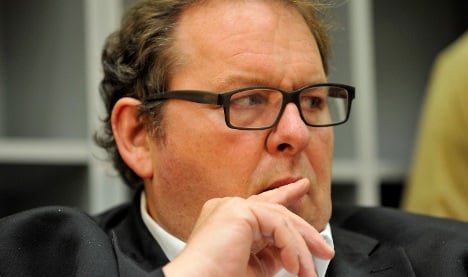After a single day of deliberations the court convicted the 29-year-old journalist of coercion and “injuring highly private personality rights,” fining him €14,400.
Two prostitutes and two middlemen, who were accused of scheming to shoot the video and sell it to the reporter, were fined between €600 and €3,600. All four confessed during the trial and apologised to the 56-year-old cabaret and television actor.
Bild publisher Axel Springer, which had said the trial was a threat to press freedoms, criticised the verdict, calling it “wrong and absolutely unacceptable for journalists and publishers.”
Judge Hilmar Buch said the prosecution had proved the Bild journalist had bought the sex tape of Fisher and the prostitutes for €3,500 in the summer of 2009, using it to pressure the actor to give an exclusive interview to the paper.
“As long as you only possess this CD, that is fine,” Judge Buch said. “But when you also use this CD to pressure someone, then it is no longer legal journalism. I don’t believe all journalists behave this way.”
Fischer told the court that without the video, he would never have given the interview to Bild, which he did not care to work with.
The journalist’s defence lawyers asked for their client’s acquittal, saying it was Fischer’s PR agent who had offered the interview and that the contents of the sex tap were not “editorially usable.”
Though a copy of the tape has never been found, prosecutors alleged that the agent and the 56-year-old Fischer, who plays a Catholic priest in the TV series Pfarrer Braun, felt forced to cooperate with the Bild journalist in the fear that it could destroy his career.
In the interview that ran under the headline, “The whores are exploiting my illness,” Fischer discussed his battle with Parkinson’s disease and his dealings with the prostitutes, who had allegedly committed fraud with his credit card.
They allegedly forged his signature for credit card charges totalling some €74,000, a matter which will be dealt with in a separate case.
Just before Christmas in 2009 Fischer took his allegations of blackmail to the public prosecutor’s office.
The German media is calling the case a unique look into how tabloids attempt to manipulate celebrities.
Munich daily Süddeutsche Zeitung reported on Monday that Fischer’s agent, experienced in the industry, said that Bild’s alleged behaviour was standard among German tabloids.
According to news magazine Der Spiegel a conviction in the case would mean a “black day” for Bild.
“Because then everyone could claim that a journalist for this paper had used criminal methods,” the magazine wrote, adding that there had been repeated rumours of such behaviour in the past.
Fischer was reportedly determined to take on the country’s biggest paper in a “campaign for justice,” his lawyer Florian Ufer told the magazine.
But after the verdict publisher Axel Springer said only an acquittal would have been the right choice, calling the prosecution’s accusations “weak” in a statement.
“We hope that the next level of jurisdiction will review this decision,” the publisher said.
The Local/DPA/DAPD/ka




 Please whitelist us to continue reading.
Please whitelist us to continue reading.
Member comments